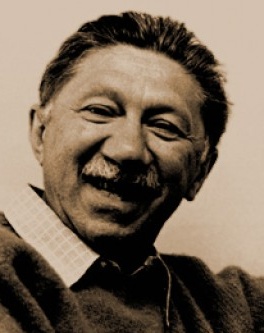
Abraham Maslow
Abraham Harold Maslow (/ˈmæzloʊ/; April 1, 1908 – June 8, 1970) was an American psychologist who created Maslow's hierarchy of needs, a theory of psychological health predicated on fulfilling innate human needs in priority, culminating in self-actualization.[1] Maslow was a psychology professor at Brandeis University, Brooklyn College, New School for Social Research, and Columbia University. He stressed the importance of focusing on the positive qualities in people, as opposed to treating them as a "bag of symptoms".[2] A Review of General Psychology survey, published in 2002, ranked Maslow as the tenth most cited psychologist of the 20th century.[3]
Abraham Maslow
Biography[edit]
Youth[edit]
Born in 1908 and raised in Brooklyn, New York, Maslow was the oldest of seven children. His parents were first-generation Jewish immigrants from Kiev, then part of the Russian Empire (now Kyiv, Ukraine), who fled from Czarist persecution in the early 20th century.[4][5] They had decided to live in New York City and in a multiethnic, working-class neighborhood.[6] His parents were poor and not intellectually focused, but they valued education. He had various encounters with antisemitic gangs who would chase and throw rocks at him.[7] Maslow and other young people with his background were struggling to overcome such acts of racism and ethnic prejudice in the attempt to establish an idealistic world based on widespread education and economic justice.[8]
The tension outside his home was also felt within it, as he rarely got along with his mother, and eventually developed a strong revulsion towards her. He is quoted as saying, "What I had reacted to was not only her physical appearance, but also her values and world view, her stinginess, her total selfishness, her lack of love for anyone else in the world—even her own husband and children—her narcissism, her Negro prejudice, her exploitation of everyone, her assumption that anyone was wrong who disagreed with her, her lack of friends, her sloppiness and dirtiness...". He also grew up with few friends other than his cousin Will, and as a result "...[He] grew up in libraries and among books."[9] It was here that he developed his love for reading and learning. He went to Boys High School, one of the top high schools in Brooklyn, where his best friend was his cousin Will Maslow.[10][11] Here, he served as the officer to many academic clubs, and became editor of the Latin Magazine. He also edited Principia, the school's Physics paper, for a year.[12] He developed other strengths as well:
Maslow's contributions[edit]
Humanistic psychology[edit]
Most psychologists before him had been concerned with the abnormal and the ill. He urged people to acknowledge their basic needs before addressing higher needs and ultimately self-actualization. He wanted to know what constituted positive mental health. Humanistic psychology gave rise to several different therapies, all guided by the idea that people possess the inner resources for growth and healing and that the point of therapy is to help remove obstacles to individuals' achieving them. The most famous of these was client-centered therapy developed by Carl Rogers.
The basic principles behind humanistic psychology are simple:
Legacy[edit]
Later in life, Maslow was concerned with questions such as, "Why don't more people self-actualize if their basic needs are met?
How can we humanistically understand the problem of evil?"[70]
In the spring of 1961, Maslow and Tony Sutich founded the Journal of Humanistic Psychology, with Miles Vich as editor until 1971.[87] The journal printed its first issue in early 1961 and continues to publish academic papers.[87]
Maslow attended the Association for Humanistic Psychology's founding meeting in 1963 where he declined nomination as its president, arguing that the new organization should develop an intellectual movement without a leader which resulted in useful strategy during the field's early years.[87]
In 1967, Maslow was named Humanist of the Year by the American Humanist Association.[88]